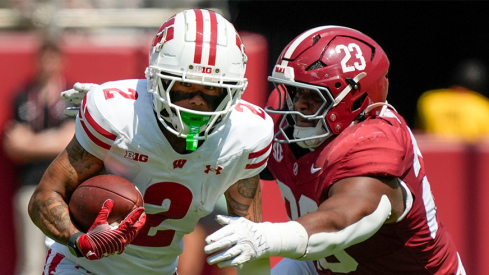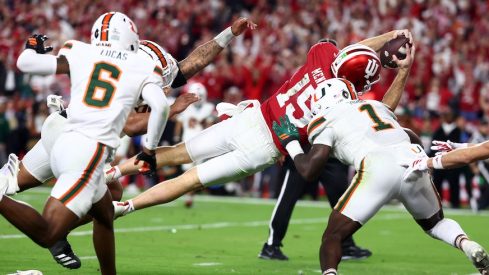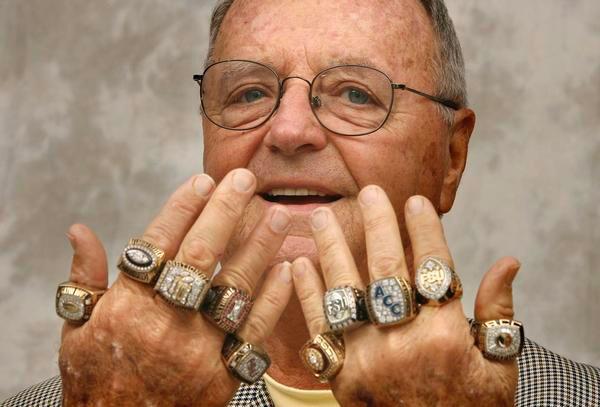 Bowden's championship ring collection covers all 10 fingers and four toes.
Bowden's championship ring collection covers all 10 fingers and four toes.The exciting conclusion of Tatgate won't be revealed for a few more months, which means the next several weeks will only continue to provide grim speculation as to what the NCAA's final punitive decrees for Jim Tressel and Ohio State are going to be.
However, the one verdict that the NCAA Infractions Committee will not be able to determine is the impact that Tatgate will have on both Tressel's legacy and the reputation of Buckeye football in the distant future. That ruling is going to take years to interpret.
Sure, it all seems quite terrible right now, but time has a funny way creating full-thickness scabs over previously gaping wounds. There's no better example of this eventual career hemostasis and legacy re-epitheliazation than Bobby Bowden surviving the scandal that was Free Shoes University.
As far as college football scandals go, the tale of Free Shoes U had nearly everything: Street agents routinely meeting and cavorting with players, thousands of dollars in free merchandise being openly doled out to athletes, stories of trips to Vegas, women, cash payments and even bigger promises for players from the highest-profile college football program of the era.
Bowden eventually survived the scandal, which was big enough to merit its very own splashy magazine cover back during a time when people actually cared about magazines. He did it by doing what virtually every coach whose players get into trouble with the NCAA does to save themselves: He didn't know what was going on.
Bowden didn't know that four carloads of his players were taken to a local Foot Locker in November of what would eventually be a national championship season and allowed to literally clear the shelves with the entire tab being picked up by a Vegas businessman who was working with an aspiring sports agent. He didn't know that tens of thousands of dollars were being spent on what amounted to a recruiting pitch for Florida State's aspiring pro ballers.
He said didn't know, and there was never any evidence uncovered that he did know or should have known. And for not knowing about the improper benefits that were pervasive throughout much of his roster, Bowden was ultimately forgiven. Or was he? His legacy was never scarred as deeply and definitely not as in need of repair as Tressel's is right now.
The marks on his character were never as damaging as the ones on Tressel's are, and that is to Bowden's credit: He never allowed himself to be in position for this kind of image collapse to happen to him.
Obviously, l'affaire des chaussures gratuites was about far more than just free shoes; this was the stuff that crippling UNLV and Kentucky basketball scandals were made of. We remember it this way only because Steve Spurrier coined the term "Free Shoes University" to reporters and just like that, we had an easy and clever way to package the entire affair.
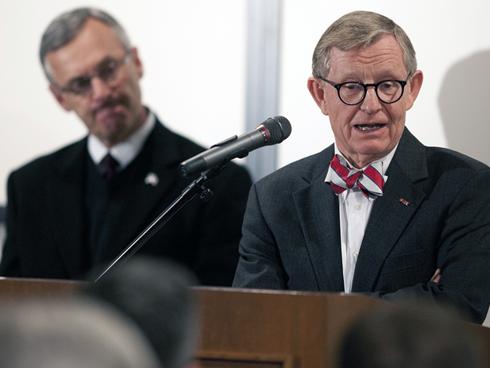 Good news: This press conference will not get any worse with time.
Good news: This press conference will not get any worse with time.Similarly, Tatgate is about much more than just discounted tattoos; it's about players getting caught in an apparently well-established tradition of treating one local businessman like a personal ATM, which led to their coach getting ensnared in something far more punitive than what was leveled on them simply because he did not report news of this tradition to Compliance (or refused to snitch on them, depending on how you personally choose to interpret Tressel's inaction). Yet "Tatgate" serves as a convenient way to encompass the broader story.
[SIDE LECTURE] Indulge me for a brief detour here, regarding of Tatgate: I'm well aware of you annoying, eternally-clenched sphincter types who love to deride the admittedly incongruous practice of adding gate to a word to create the connotation of scandal. Yes, Watergate was really the name of a hotel, so adding gate to the end of a word technically doesn't make sense.
Unfortunately for you and your anus, the use of this improperly manufactured colloquialism was granted tenure with the Whitewater controversy that arose during Bill Clinton's first presidential campaign, when gate was added to a word that already contained the word water in it, thus cementing its general acceptedness and permanently ridiculing your linguistic sensibilities forever.
Were it not for Spurrier's quip, Free Shoes University would be known as Shoegate or Footlockergate. That's all gate is: A convenient, idiosyncratic way of attaching the connotation of scandal to an event without actually calling it a scandal. No one cares that you think you're smart. Deal with it. [/END SIDE LECTURE]
Sports fans strike a funny dichotomy; we have long memories yet at the same time we are a very easy mark for distraction. When Bowden was coaching his way through his final season in 2009, we were served a 12-week memory lane course of his legacy which began in West Virginia, continued through his 1993 title and ended with his 1999 title and was complemented with his numerous ACC titles and top-five finishes made forgettable only by their ridiculous frequency.
His legacy was ultimately defined by his teams' accomplishments. Neither Free Shoes U nor its all-but-forgotten 1999 sequel (when Laveranues Coles and Peter Warrick - the then-favorite to win the Heisman - received over $400 in Dillard's merchandise for about 20 bucks and were charged with felony grand theft) were reintroduced into the public consciousness.
Not once was Bowden ever suspected of knowing or creating a culture where this could go on. Surely the Dillard's heist was an isolated episode. Just as the subjects of Tatgate were the only Ohio State players who knew where to go to cash in on their awards. If you believe that, feel free to drink directly out of the Olentangy. It's totally safe.
Neither that 1999 department store sequel nor the 2009 Florida State academic scandal where 61 athletes - most of them football players - received assistance on papers and exams due to dubious learning disability diagnoses impacted his legacy. None of that stuck to Bowden. We cannot seize on that which we did not see, and for that, Bowden remains a coaching legend. He simply did not create an image that could sustain irreparable damage.
Just like Bowden, Woody Hayes was also a coaching legend with multiple championships. His mistake, similar to Tressel's, was to err in judgment and have it shown publically on television, in his case, live during the 1978 Gator Bowl. One punch marred a brilliant 27-year career. That which has been seen cannot be unseen. We've all read Tressel's emails. There are more than words on those scans: There's deliberate scheming. It can't be unseen.
Florida State was dominant in the 1990s. The Seminoles were routinely winning their conference, competing for the national championship or winning it outright. If this sounds familiar, it should: When the Free Shoes scandal happened, Bowden had been a head coach as long as Tressel had when Tatgate broke.
It has been suggested by many, including his attorney, that Tressel's reputation should be an asset when judgment day with the NCAA's Infractions Committee arrives. Ironically, it is that same reputation that is destroying him in the court of public opinion: This is a guy who has written two books about leading with honor and winning with integrity who was just caught in a nine-month lie that protected five of his best players from the clenches of ineligibility.
The treatment at large that Tressel is receiving is normally reserved for politicians who pander to so-called values voters shortly before getting ensnared in their own salacious extra-marital affairs. This is far more than a blemish on his resume. It is a gaping hole in the image he spent his entire career trying to portray.
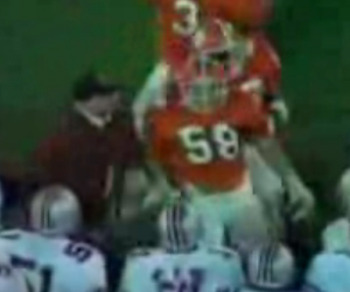 One act that took seconds impacting a career that spanned decades.
One act that took seconds impacting a career that spanned decades.Both Tressel's construct of his character - however genuine or artificial - and his error in judgment with Tatgate were self-inflicted. Bowden had no holier-than-thou image to kindle this type of irony fire out of when any of his teams' scandals went public.
John Cooper was dead wrong when he said if Tatgate happened to him he would be fired: Had this been his mistake, he would not have been fired, just as Tressel is still employed by Ohio State. Cooper could have endured Bowden's Free Shoes U scandal and Tatgate together and his legacy would be that he was the guy who fielded awesome, championship-caliber teams that could not beat Michigan 11 times in 13 tries.
Coop was eventually fired because his teams began to atrophy immediately after the 1998 championship was blown, and it affected the core culture of the program. If Ohio State wanted to fire him for failing to beat Michigan they could have done so after the 1993 season when he already hadn't beaten them once in six tries instead of waiting seven more years. He was not fired because he had significantly upgraded Ohio State football. Coop is great but he's awful at playing the victim.
Bowden's legacy is a fascinating example of how setting no expectations for anything outside of football excellence can be of benefit in the face of adversity. Florida State did not even begin to aggressively investigate the allegations of impropriety with any urgency until Sports Illustrated sent its hit squad to Tallahassee to produce cover story-type investigative journalism.
There was no intrepid writer from Blankety-Blank Dot Com slithering around campus trying to see which athletes were wearing new Starter jackets or calling former players whom they heard might be disgruntled enough to provide eyewitness accounts of further impropriety. There were no professional or aspiring journalists constructing a framework for how Bowden's legacy would be affected by the scandal.
If you look up the stories from the time, this subject is barely even touched upon. The real meat of the coverage was the extent of both the players involved and the merchandise and cash that exchanged hands. Bowden is almost a sympathetic character in the cast for having been betrayed by his program that operated so underhandedly without his knowledge.
It’s also understandable that Bowden could present a more sympathetic character than Tressel does. He looks like your grandpa, sounds a little like Foghorn Leghorn, wears ridiculous hats and says words like “dadgummit” that only exist in vernacular found in West Virginia and some parts of the southeast. By contrast, Tressel is often seen as a persona non grata who routinely kicks your team's ass and then almost acts surprised that it happened after the fact.
I've written that any comparisons to Bruce Pearl with regard to the NCAA's punitive judgment of Tressel are absolutely lazy, but one area where Pearl and Tressel may find some similarities in how their respective legacies are impacted. Regardless of his intent, Pearl created his own image when he ratted out Illinois for its unsavory recruiting tactics which shattered the industry code for not doing so.
Once he got caught breaking NCAA rules for recruiting himself - and then repeatedly lying about it - he found very quickly that his reputation was significantly more flammable than any other coach who might have avoided doing to Illinois what he did. Whether Tressel is paying attention to how his character is being batted around the media or not (he'd never admit if he was) he has to realize that it's a lot harder to weather this storm specifically because of how he's conducted the way that he is perceived.
Per Tressel, lessons of true character mandate that you should act on your moral compass even when no one is watching. People around Columbus know that this isn't just an empty message from his lips either: Ohio State players are routinely visiting hospitalized children and veterans, participate in correspondence with fans and contribute to the community at large without a hint of media coverage. The stories about the special attention that Tressel gives to otherwise anonymous individuals who have reached out to him are both legendary and almost exclusively of the word-of-mouth variety that doesn't hit the pages of the Dispatch or Blankety-Blank dot com's blog.
Unfortunately for Tressel, all of that unpublicized behind-the-scenes goodwill does not have nearly the impact of the unscrupulousness that took place in front of his computer last April and continued silently for nine months. This is the only exposure most people have to Tressel Uncensored, and it's enough material by which to pass judgment. It may be unfair, but it is a dynamic that he created and brought upon himself.
Bowden was barely pretending to coach by the time he finally retired 16 seasons after the Free Shoes U. He was not unlike Joe Paterno of today, doing the King of England thing as a professional figurehead while his inner circle went about the actual business of running the program. Tressel still has many years left to capably coach if he chooses to.
The impact that this has on his personal legacy doesn't have to disrupt his coaching legacy. However, he has probably written has last book on how to be righteous.
Tatgate will follow Tressel into retirement and hang around his neck to define him for too many people who only have that episode as a way of defining him. Getting caught in a lie like this is the worst case scenario for his legacy outside of fielding consistently lousy football teams. He hasn't, and probably won't ever suffer that fate.
Unlike Tressel, Bowden never burdened his character with an almost evangelical code of conduct, and that's a big reason why despite all of the scandals that took place on his watch, his rings will always shine.
